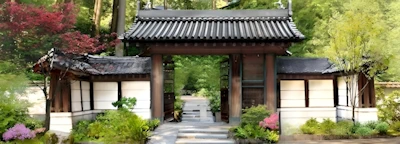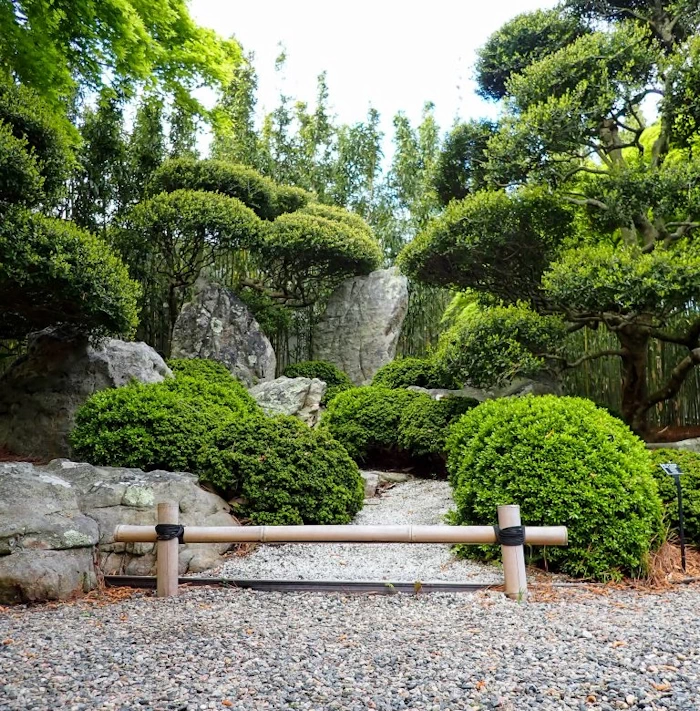Norfolk Botanical Garden - Japanese Garden
Event Location
Norfolk, VA 23518
In the scenery of spring, nothing is better, nothing worse; The flowering branches are of themselves, some short, some long. - Ryōkan
Few gardening styles have the same prominence and allure as Japanese gardens. What is it about this style that compels us so? Where does its inherent tranquility come from? The path to enlightenment starts here!
First, a look at the more familiar occidental approach to garden philosophy will help us understand. In traditional American and European styles, the fingerprint of humanity is evident in both conception and practice: beds are full to bursting with homogenous blooms, often arranged in terraces or composite structures, while topiaries are sculpted in regular geometric shapes. The intention behind this design is to maximize visual interest through artistic principles such as color theory, recurring patterns, symmetrical lines, and even spacing. In a word, there is order that pervades the landscape.
The genius of the Japanese garden lies in its counter to these principles of order. Instead, the goal of the design is to elicit an impression of the natural-a reprieve from our need for logical construction. This idea is often expressed as Zìrán, Chinese for “of itself so,” “naturally,” or “freely.” The template for Japanese gardens was originally imported from China by endeavoring traders. Along with the technical aspects of landscaping, the philosophic concepts of Daoism (or Taoism) were also infused. This school of thought recognizes the ephemeral and spontaneous characteristics of Nature, while the influence of Buddhism insists on an austere attitude toward decoration. Japanese gardens are therefore interpretive microcosms or idealized scenes of the natural world. They utilize miniaturization, concealment, borrowed scenery (inclusion of the surrounding landscape), and asymmetry to give the impression of stumbling on a picturesque scene during a stroll in the country. As garden historian Michigo Young points out, “It is an interpretation rather than a copy; it should appear to be natural, but it is not wild.”
Another key element of Japanese gardens is their symbolization. The first iteration of these gardens came from the main Japanese island of Honshu, and so the primordial elements of the island are represented: mountain peaks and narrow valleys as craggy rocks; mountain streams in the form of cascades; lakes as ponds with banks of small, smooth stones. Water is the ubiquitous element found in all Japanese gardens. Zen gardens don’t contain literal water but instead represent it in rippled sand with various rocks as islands. At least one island is generally present in all Japanese gardens, meant to represent Mount Penglai or Mount Horai, the island home of the Eight Immortals of Daoist teaching. Also, bridges can represent the path to paradise and eternity.
Other structures contain more practical importance. The Japanese stone lantern, or tōrō, originated in Buddhist temples, but during the Momoyama period they were used to light the paths through tea gardens. Now, they are employed as decoration, but austerity principles dictate they be used sparingly and in areas of sensible operation. The stone water basin, or tsukubai, is another common element. They were initially used by garden visitors to wash their hands and mouth before tea ceremonies. The basins were placed low so the attendee needed to bow in order to drink. This served to humble the mind-a state conducive for the occasion. In one instance, a gardener hid the view of the ocean so that only guests who undertook the rite of the bow would see it through the brush from the low position. In this way, the connection to the basin and the ocean was made clear without a single word.
The spirit of the Japanese garden links our perception of the world back to nature, a return to our true self. In design, the style encourages us to forgo our rules of composition, our measurements, our nagging need for order and structure. Japanese gardens allow us to slow down and recognize that Nature never makes an aesthetic mistake: the grain in wood, the texture of rocks are masterworks of arbitrary design. So, if you want to understand what makes a great Japanese garden, consult the knots of trees and the bubbles in waterfalls. They will show you all you need to know.
Design, Gardens, History, Japanese
-Jeff Lysko
Contact
Phone: (757) 441-5830Location Website
Click to Visit
(For Event Information See Event Website Page)
Authentic Japanese Gardens (United States)
Best Japanese Gardens in the United States
Japanese Rock 'Zen' Gardens (United States)
Best Japanese Rock 'Zen' Gardens in the United States
Japanese Teahouses (United States)
Best Japanese Teahouses in the United States

















